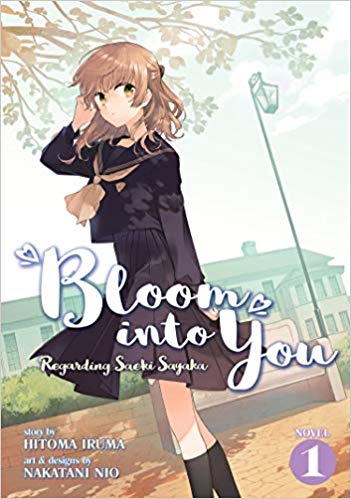By Hitomi Iruma and Nakatani Nio. Released in Japan as “Yagate Kimi ni Naru: Saeki Sayaka ni Tsuite” by Dengeki Bunko. Released in North America by Seven Seas. Translated by Jan Cash and Vincent Castaneda. Adapted by Jenny McKeon.
As I was reading the 3rd and final volume of this spinoff series, I began to feel that it was less of a novel and more of a reward. A reward for Sayaka, who, after two books of repressed feelings and failed romances, finally gets to experience a joyous love. And a reward for the reader, because man, this book is a bright ball of sunshine. Sayaka and Haru’s interaction is simply a joy to read, Sayaka’s ongoing inner monologues are revelatory, especially her growing realization that yes, this is in fact real love she is feeling and it’s not the same thing as the love she has for Those Two Girls. (Though that may be the funniest scene in the book… are those two also a couple, by the way?) The continuity between the three books is fantastic, playing into reader expectations very well. And, at last, Sayaka and Touko finally get together to talk post-graduation, though that is the one note of bittersweetness in this sugary book.
The cover pretty much sets the stage. After seeing Haru crying at the end of the previous volume, the two have become friends, and the book begins with Haru confessing to Sayaka… though also admitting that her personality is the sort that also lets go of things easily. This actually doesn’t become apparent as the book goes on, as Haru is quite patient with Sayaka, who spends the entire book musing about what she feels for Haru, how it compares to her feelings for her old sempai, or Touko, or even the girl from the pool in elementary school. The book is mostly a series of conversations, showing us a Sayaka who is opening up to others far easier than she used to but is still definitely herself. Sayaka agrees to go out with Haru on a “trial basis”, as Haru puts it, and rapidly realizes that this *is* different from the others, and that she really has fallen in love.
Addressing the elephant in the room, yes, Haru sure does look like Yuu, but they’re not very much alike. She also resembles the swimming girl from Book One, to the point where the author includes a scene with Sayaka watching a TV show interviewing a swimmer who is clearly meant to be the same girl. What’s more, the climax of the third book once again takes place in a pool, with Sayaka and Haru’s underwater “confession” being incredibly emotional and heartwarming. (I admit I was also happy to see the swimming girl had recovered from Sayaka’s fleeing.) The conversations, both in dialogue and in text messages, felt very in character on all sides, and I was once again very happy to see that this is nothing whatsoever like the author’s other series, Adachi and Shimamura. And I really enjoyed the emphasis on names, and how Sayaka’s manner of addressing Haru changes over the book as her feelings grow. (But she still says “Koito-san”.)
There is a question in this book about whether a college student really is more “grown up” than a high school student, and you get the sense Sayaka is still maturing in that regard. The epilogue shows she has not gone as far with Haru as Yuu and Touko have. But that’s fine, because they’re different couples behaving differently. And even though there’s some sadness as Sayaka realizes she and Touko will likely grow more distant over time, the overall feeling after finishing this book is happiness that Sayaka and Haru are really in love, and what they brought to each other’s lives.


